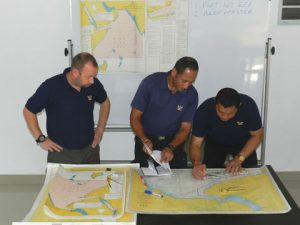
Damian-McCormack-Special-Projects-Manager-at-GoAGT-supervising-the-City-Guild-MSO-instruction-course-at-the-training-centre-in-Galle-Sri-Lanka
Cyber attacks on container ships and port infrastructure will get more sophisticated as time goes on and companies should be doing more to protect their supply chain security.
He added: “The moving parts of the supply chain coupled with just in time delivery mean security is a necessary evil and one that is hugely misunderstood. Fusing data and more importantly sharing that data with agencies that can stem, illegal contraband, drugs, weapons and the like is a distant goal far from being achieved.”
Alex Fidgen, Director at IT security company MWR InfoSecurity, said: “After the port successfully detected the attack against their computer systems, they failed to map out other attack paths which allowed the attackers to achieve their objectives in this case. This demonstrates how important it is to not only focus on single systems but get a full overview of your organisation and the potential weaknesses in penetration testing exercises.”
He added: “This attack played out somewhat like an Advanced Persistent Threat (APT). They were apparently active for around two years, and were able to make use of advanced techniques with seemingly professional execution. However, this is what anyone can now buy on the black market as a service, so far from just being available to a nation state, anyone with money can purchase these services.”
Both organisations said that the attack showed the continued development in “professionalism” in the upper end of the black market and that organisations that facilitate large transactions will experience greater numbers of sophisticated attacks.
The kind of hardware\software attack witnessed against Antwerp used to be the sole domain against attacks on banks, so there is a gradual transference to the ‘norm’.
The organisations said that the criminals might have overplayed their hand by providing such overt signs of compromise (I.e. stealing containers). But this only demonstrated how easy it is to remain non detected if criminals so wish.
Alex Fidgen said: “It shows that the types of attacks like this aren’t hypothetical and businesses should be doing penetration testing exercises to make sure that they have not been compromised.”
Nick Davis said: “This recent example in Antwerp will only get more sophisticated and better, and the chances of x-raying every container in every port is unfeasible and unworkable.”
Ends
For further information please contact:
David Barzilay – e: david@barzilay.co.uk / m: 078 6032 2333
Julian Menendez – e: julian@barzilay.co.uk / m: 078 3854 7531
Alex Fidgen, MWR InfoSecurity – m: 077 8841 0607
Nick Davis, GoAGT – m: 078 0972 7001
About MWR InfoSecurity – www.mwrinfosecurity.com
MWR InfoSecurity is one of the world’s leading information security consultancies – MWR specialises in identifying, managing and mitigating Information Security risks.
MWR InfoSecurity undertakes simulated attacks with companies to help them understand the issues they are facing
About GoAGT – http://goagt.org/
GoAGT Ltd. (Gulf of Aden Group Transits Ltd.) has been in continuous operation since 2008 and has achieved an enviable 100% success rate on over 1600 Armed Security Transits throughout the Indian Ocean. Annually GoAGT provides over 50, 000 man days of protection at sea and since commencing operations we have protected in excess of 38, 000 seafarers.
GoAGT now employs over 300 personnel and at any one time between 160- 180 security personnel are deployed. GoAGT recruits from the UK Royal Marines, Parachute and other Army regiments with front line experience, as well as the Irish Navy, Estonian Army and Filipino Marines.





